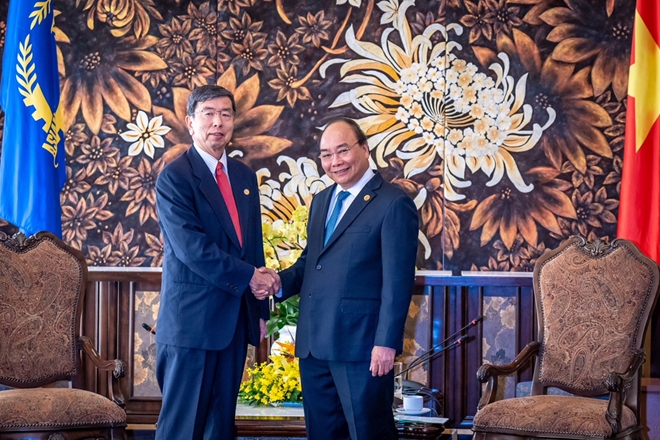Prime Minister Nguyen Xuan Phuc meets ADB president in Danang
Mr. Nakao, who took part in a panel on Delivering Transformation at the opening session of the GEF Assembly, affirmed that ADB could step up collaboration with GEF.
 |
| Prime Minister Nguyen Xuan Phuc meets ADB president in Danang. |
“Overall, the proposed GEF programming directions covering climate change, biodiversity, land degradation, international waters, and chemical and waste management are well aligned with ADB’s draft Strategy 2030 priorities for environment and climate change,” Mr. Nakao said. “Working together, ADB and GEF can assist developing countries to transform economies toward sustainability. This can include developing new knowledge and innovative project investments, as well as green financing mechanisms to help unlock private sector finance for development.”
The GEF Assembly—the organization’s highest governing body—meets every 4 years and is expected to endorse $4.1 billion in financing to support the global environment from 2018 to 2022.
Since 2004, GEF has approved grants to ADB for 55 projects amounting to $246 million, out of which 19 projects have been completed. Currently, ADB and GEF are partnering to support 36 projects being implemented in 21 countries across Asia and the Pacific, with $178 million in grants from GEF linked to $2.1 billion in financing from ADB.
The projects support a range of innovative approaches. In India, ADB, GEF, and the UN Environment Programme are collaborating to support energy efficiency investments. ADB will invest $400 million to scale-up LED lighting systems, with a $18.6 million GEF grant to develop new markets for super-efficient appliances and smart grids.
In Viet Nam, ADB and GEF have collaborated on three projects to address climate change, protect biodiversity, and improve the livability of cities. In the Trung Truong Son Mountain Range, the Biodiversity Conservation Corridors project, with a $4.3 million grant from GEF and a $30 million investment from ADB, is supporting local communities to improve their livelihoods, protect biodiversity, and enhance forest management. In Ha Giang, Hue, and Vinh Yen, GEF and ADB are collaborating on “Green City” planning approaches for sustainable and resilient urban development through a $14.2 million grant from GEF and $178 million financing from ADB. In 2017, ADB and GEF completed an innovative project to test low-cost bioengineering and other nature-based approaches to address flood risks for rural infrastructure in mountainous areas.
During the GEF Assembly, the GEF Council approved a $15.5 million grant to cofinance the Sustainable Management of the Bay of Bengal Large Marine Ecosystem Program. Led by the UN Food and Agriculture Organization and ADB, this new program will implement strategic actions to protect ecosystems, fisheries, and livelihoods in eight countries bordering the Bay of Bengal.[1] As part of the program, ADB will support waste water treatment and solid waste management to address pollution in Myanmar’s Irrawaddy River, through the proposed Second Mandalay Urban Improvement Project.
In his meeting with the Prime Minister—who opened the Assembly—Mr. Nakao commended the government for maintaining macroeconomic stability and steering Viet Nam’s economic growth to 7.4% in the first quarter of 2018, the strongest first quarter growth in 10 years. Efforts to rein in the fiscal deficit, combined with higher economic growth, have helped reduce the ratio of public debt to GDP.
Mr. Nakao reaffirmed ADB’s commitment to further support Viet Nam’s transition to high middle-income status, making available up to $1 billion a year in sovereign loans. ADB will also actively seek to mobilize concessional cofinancing, and provide high-value adding knowledge products and services, including in the areas of intra-regional and urban transport, agricultural and rural development, poverty reduction, waste water and drainage, and climate change resilience.
During his talks with Mr. Tho, Mr. Nakao discussed ADB’s ongoing support to improve water supply and solid waste management in Da Nang. Mr. Nakao also visited the Da Nang Business Incubation Center, which is supported through the Mekong Business Initiative technical assistance, funded by ADB and the Government of Australia. The center provides business support services to entrepreneurs, including to promote green technology to address the city’s environmental and traffic congestion challenges.
[1] These countries are Bangladesh, India, Indonesia, Malaysia, Maldives, Myanmar, Sri Lanka, and Thailand.

